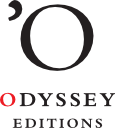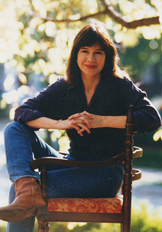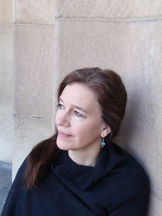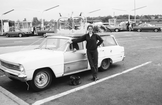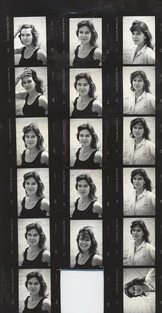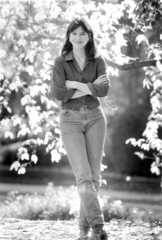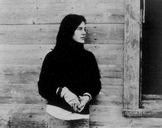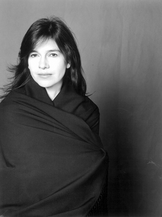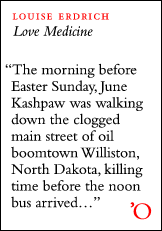Louise Erdrich
Louise Erdrich was born in Little Falls, Minnesota in 1954. Her father, Ralph Erdrich, was of German descent, and her mother, Rita Gourneau, of French and Chippewa Indian descent. The oldest of seven children, she grew up in Wahpeton, North Dakota. At an early age Erdrich was encouraged by her parents, both of whom taught at the Bureau of Indian Affairs, to write stories. Erdrich continued her writing by keeping a journal throughout high school.
In 1972, the first year that Dartmouth admitted women, Erdrich enrolled there as a student of English and creative writing. She took courses in the newly implemented Native American Studies department, whose chair was the writer Michael Dorris. Erdrich graduated in 1976, and received her Master of Arts degree in writing from Johns Hopkins University in 1979. A few years later, she was invited to return to Dartmouth to read from her work and eventually, to be a writer-in-residence. She and Michael Dorris were married in October 1981.
Erdrich won the $5,000 Nelson Algren Fiction Award in 1982 with her short story “The World’s Greatest Fisherman.” This would later become the opening chapter for her first novel, Love Medicine (1984), which explores the loss of cultural identity over several generations of a Native American family. Erdrich received the National Book Critics Circle Award for Best Fiction for Love Medicine, which is the first of a series of interconnected novels including The Beet Queen (1986), which also received a nomination for the National Book Critics Circle Award, Tracks (1988), The Bingo Palace (1994), and Tales of Burning Love (1996).
Other awards for Love Medicine include the Pushcart Prize in 1983, the National Magazine Fiction award in 1983 and 1987, the Virginia McCormack Scully Prize for best book of the year dealing with Indians or Chicanos in 1984, and the Los Angeles Times Award for best novel. In 1985, Erdrich received the Sue Kaufman Prize for Best First Novel and the American Book Award. The novel was also named among the eleven best books of 1985 by the New York Times Book Review.
Erdrich followed the success of her earlier novels with The Antelope Wife (1998), The Last Report on the Miracles at Little No Horse (2001), which was nominated for a National Book Award, and The Master Butchers Singing Club (2003), a mystery which draws upon both her Native American and German-American heritage, as well as Four Souls (2004) and The Painted Drum (2005). Often overlapping across the same fictional terrain of a North Dakota reservation, her novels together create a narrative of richness and depth that combines multiple local stories with modern techniques and consciousness.
She is also the author of three volumes of poetry, Jacklight (1984), Baptism of Desire (1989) and Original Fire (2003) and five children’s books, Grandmother’s Pigeon (1996), The Birchbark House (1999), The Range Eternal (2002), The Game of Silence (2004), and The Porcupine Year (2008). Among her many other honors, Erdrich has also won the O. Henry Prize for short fiction, the Western Literary Association Award, and a Guggenheim Fellowship. Her stories have appeared in The Best American Short Stories series, The New Yorker, Harper’s, The Atlantic, and The Paris Review, among others. Many of them were collected in one volume, The Red Convertible: Selected and New Stories, in 2009.
Most recently, The Plague of Doves (2008) was named a finalist for the Pulitzer Prize and won the Anisfield-Wolf Book Award. Erdrich followed this novel with the equally accomplished Shadow Tag (2010), tracing the dissolution of a marriage and family. In the fall of 2010, The Master Butchers Singing Club will have its stage debut at the Guthrie Theater in Minnesota, in an adaptation by Marsha Norman. Erdrich also appeared in this year’s PBS documentary program, Faces of America, which explores the lives of prominent Americans and their immigrant heritage, hosted by Henry Louis Gates, Jr. and including Malcolm Gladwell, Meryl Streep, and Yo-Yo Ma, among others. She is an enrolled member of the Turtle Mountain Band of Chippewa.
Erdrich currently lives in Minnesota with her daughters. She is the owner of Birchbark Books in Minneapolis.
Interview with Louise Erdrich & Bill Moyers.
The Master Butchers Singing Club at the Guthrie Theater.
Books By Louise Erdrich
Love Medicine
Told from the multiple perspectives of two Ojibwe families, Love Medicine gives voice to the blessings and the burdens of kinship. Erdrich introduces the Kashpaws and the Lamartines – men and women whose lives are a testament to the endurance of a people and the sorrows of history. Love Medicine is the first of Louise Erdrich's polysymphonic novels set in North Dakota – a landscape that, in Erdrich's hands, has become as iconic as William Faulkner's Yoknapatawpha County.
 |
